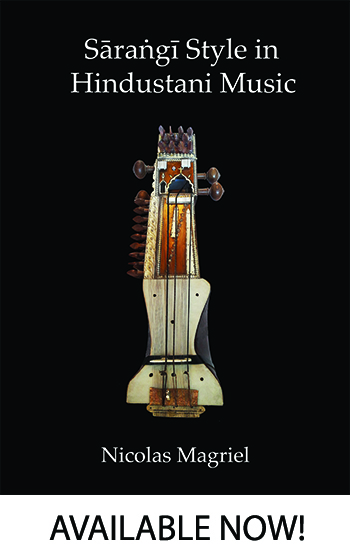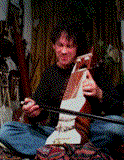
Chanda Khan was an excellent sarangi player of Banaras. To my knowledge he and Ustad Zakan Khan and Zakan Khan's brother Faiyaz, were, in the 1990s, the only remaining functional Muslim sarangi players in Banaras. As a Muslim in a Hindu stronghold, he never got the recognition he deserved. He lived and worked, accompanying tawayafs, in Dalmandi, the red light district. He also did occasional concerts at musical venues set up for entertaining tourists. He had a robust but sweet style, a beautiful touch for thumri and tappa. I filmed his concerts and also his accompaniment with the tawayaf Lakshmi Devi at a mujhra which I organised in Nagwa, Varanasi. I also filmed him at home with another tawayaf (soon to be uploaded).
Our first series of videos are from the mujhra with Lakshmi Bai in April 1994. This film gives great insight into sarangi players' traditional situation. They were not only the accompanists of tawayafs but also their teachers, and often their business managers. In the videos with Lakshmi Bai below, he can be seen coaching her and reminding her of song texts. I have presented the entire mujhra in reconstructed order, rather than separating the solo sarangi pieces, which were impressive. Sarangi breaks give the singer a chance to rest. The addition of a tambura playing the drone is not native to the mukhra situation historically, and it can be observed that Lakshmi Bai, used to singing with harmonium, is somewhat disturbed by the drone. The sarangi breaks show that Chanda Khan's strongpoint was not rag. He was excellent technically, had great clarity, but was most at home with the semi-classical and folk repertoire of Banaras. This was probably typical of many sarangi players in the old days when their main livelihood came from association with tawayafs.
Lakshmi Bai began with a famous bol banao thumri in Mishra Tilang "ankiyan rasile tore Shyam":
This was followed by a dadra:
Now Lakshmi Bai sang a ghazal:
Next was a chaiti, beloved in Springtime:
Now we have a sarangi interlude by Chanda Khan wandering between a variety of rags while people chat and Lakshmibai looks at her song book, figuring out what to sing next:
Then a hori ("karana mose barajori"—the heroine complains about Krishna hassling her) sung by Lakshmi Bai:
Then Chanda Khan gives us another sarangi interlude, a bit of Manj Khamaj, a bit of Kafi:
Now Lakshmi Bai gets up and dances as well as doing seated abinaya, calculated to thrill the men in the audience. Contributions are encouraged and at one point, eaten off the floor:
Next we have a tappa. Here Chand Khan's hotness really shines through:
And then another ghazal:
Chanda Khan demonstrates the playing of tappa in thath tuning (the middle string of the sarangi tuned to Sa):
Then Chanda Khan plays the same tappa in charga tuning (the first string tuned to Sa):
After that, Lakshmi Bai treats us to a dadra in Bhairavi. Interestingly, here Chanda Khan positions Sa as a stopped note (where Re or Dha normally is) on the second string—so as to accommodate Lakshmi Bai's pitch:
Finally Chanda Khan improvises, tired at the end of the mujhra. This is vaguely in rag Yaman with some impressive tans, and a bit of Maru Bihag:
Our next video is from a concert 23 March, 1994 at, if my memory serves me, one "Music Ashram" in Banaras where diverse musicians were brought to perform, poorly paid, for foreign travellers. Chanda Khan played rag Patdeep:
May 2024: I am now editing, converting and uploading many jewels from my collection of videos from the 1990s, including this series filmed at Chanda Khan's residence in Dalmandi, Banaras. We will presently meet another tawayaf, Sayeeda Begum. First plenty of tuning and a tappa:
Followed by a Manj Khamaj thumri:
Then there was a special treat when the songstress Syeeda Begum joined and together they performed a Khamaj thumri:
This was followed by Pahadi:
And our session ended with yet another fabulous tappa on solo sarangi:
Here we have a solo concert at Sursangam, one of the venues that were sprouting up in Banaras in the 90s where foreign travellers could be entertained by somewhat exploited classical musicians. On this occasion the lighting was abysmal due to a power outage. First Chanda Khan played rag Kirwani:
Followed by a dadra in Piloo:
And then rag Puriya Dhanashri:



